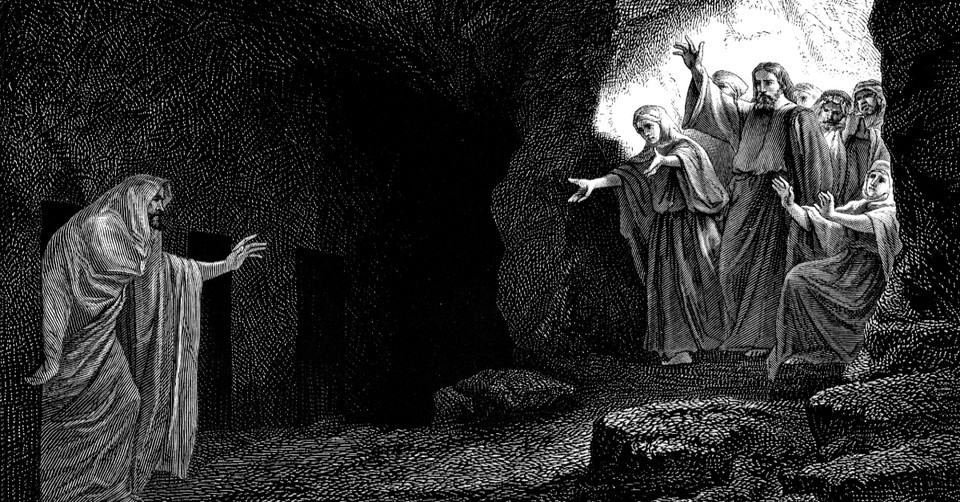Who Was Lazarus in the Bible? - 7 Important Questions Answered

Lazarus aroused curiosity even during the time of Jesus. In John 12:9, we read that a crowd followed Jesus but not only to see him, they also came to see Lazarus who was an ordinary man who had a life and death altering experience that intrigued them and still amazes those who read it.
The account goes beyond the miracle to see how curious people and enemies of Jesus reacted. Like any news station that doesn’t like the story, enemies wanted to bury the news, kill the rescued man, and bury him again. Those who wondered about it, wanted to meet Jesus and Lazarus, to find out more.
Why Is Lazarus a Remarkable Name?
Lazarus means God HAS helped, past tense, already done. To have a name that in hindsight is a prophecy is remarkable. His parents named him long before he needed the Christ to restore his life. Thus, his very name gives us all hope. How amazing that we can hope before we ever have a need. It’s Jesus who makes the difference. Lazarus went from ill to dead and then laid in a tomb wrapped in burial cloths for four days. He took no active part in the drama until Jesus spoke to him.
How Did People Respond to the News of Lazarus?
Lazarus become so ill that his sisters sent for Jesus. The story of the death of Lazarus is found in John 11:1-12:9. When Jesus heard that Lazarus was unwell, he stayed put for two more days. He didn’t rush off to heal his friend or even head to a town closer to his friend. He simply stated that this illness was for the glory of God and would not lead to death. His words should have assured and comforted his friends. His absence probably worried the sisters. They had seen many miracles and knew Jesus had God’s power, so this should have helped them trust Jesus.
No further news came before Jesus announced that Lazarus had died, and he wanted to go to him. He told the disciples he needed to awaken Lazarus from sleep. Jesus knew and loved the family. His sister Mary had washed and anointed the feet of Jesus. Finally, he headed to Bethany. The reaction of people involved with Lazarus and Jesus reflected human responses. Mary and Martha sent word to Jesus to help them but gave up waiting once Lazarus died. They allowed the anointing and wrapping of burial cloths and placed Lazarus in the tomb. They lost hope that Jesus could help.
The disciples tried to prevent Jesus from heading to Bethany. They warned him that people in Judea planned to stone him. They feared wicked men over trusting Jesus. They felt the story ended with death. They seemed to ignore the words that Jesus wanted to wake up Lazarus. Friends of Mary followed her when she went out to meet Jesus who had sent for her. They thought they were going to the tomb to weep with her. They planned to console her and had no thoughts of a reason to celebrate. That placed them within hearing of the conversation between Mary, Martha, and Jesus, one in which Jesus urged them to believe in his power.
What Do We Learn from Jesus as He Spoke to the Sisters of Lazarus?
Lazarus remained still in the tomb as important words passed. Martha went to meet Jesus when she heard he came. He greeted her with the words, “Your brother will rise again.” Martha responded as many grieving loved ones respond to platitudes and well meant words. It probably seemed empty to her and she vaguely said she knew about the resurrection on the last day. Jesus emphasized his meaning by stating, “I am the resurrection and the life. Anyone who believes in me will live. Do you believe this” (John 11:24-25)? Martha responded, that she believed he is the Christ and the Son of God.
Lazarus remained in the tomb, waiting to be called, but Jesus was not even in the village yet. Martha sent her sister Mary to Jesus, and she fell at the feet of Jesus and cried in despair that her brother would not have died had he come. She showed she believed in his power to heal a person before they died. Jesus saw her tears and all the people crying. The weeping moved him to compassion. John 11:33 relays that Jesus was moved and troubled. We learn the Jesus cares deeply about people.
Why Did Jesus Weep if He Knew He Would Raise Lazarus from the Dead?
John 11:33-37 states, "When Jesus saw her weeping, and the Jews who had come along with her also weeping, he was deeply moved in spirit and troubled. 'Where have you laid him?' he asked. 'Come and see, Lord,' they replied. Jesus wept. Then the Jews said, 'See how he loved him!' But some of them said, 'Could not he who opened the eyes of the blind man have kept this man from dying?'”
The tears of Jesus cause us to ponder. He did not weep because his friend was dead, for he knew he would restore his life. He did not weep until after he asked where to find Lazarus. They invited him to come and see the tomb. No one believed Jesus could help a dead man. Jesus stood between the living and the dead with full knowledge of what would come next; at that point he wept. The crowd thought they knew why he cried — because he loved Lazarus and mourned his loss. But Jesus knew he had not lost Lazarus, so why might he have wept?
The Gospel Transformation Bible (Bryan Chapell, General Editor; Dane Ortlund, Managing Editor) explains:
"Jesus identifies with us in our pain and loss. He comes to us in our weakness and brokeness. Though he knew he was about to raise Lazarus from the dead, Jesus wept when he saw the tears of Mary and her companions. This is Jesus being truly human. As God incarnate, Jesus shows us what he, as God, created man to be—a whole-hearted lover of God and a compassionate lover of fellow image-bearers—summarized in the two great commandments (Matt. 22:34-40).
But as the incarnate God, Jesus' tears in front of Lazarus's tomb are of a differnt order. This is Jesus feeling the weight of the fall—the violation and disintegration of the way things were meant to be. His holy tears are those of the Creator grieving over the way things were meant to be. His holy tears are those of the Creator grieving over the forfeiture of beauty through the intrustion of sin and death. Once again, in the incarnate Lord, we see the heart of the Lamb who would offer his life to overcome our sin and death."
Similarly, the NIV Biblical Theology Study Bible (D. A. Carson, General Editor), starting with verse 33, comments:
"Jewish funeral custom dictated that even a poor family hire at least two flute players and a professional wailing woman, and this family was not poor. [Jesus was] Outraged—not merely emotionally upset because of empathy, grief, or pain but angry—at (1) the sin, sickness, and death in this fallen world that wreaks so much havoc and generates so much sorrow and/or (2) unbelief itself, for the people were grieving like pagans, 'like the rest of mankind, who have no hope' (1 Thess 4:13) in spirit. Internally, in the core of his being.
[Here wept means to] Shed tears (a Different word than the loud 'weeping' in v. 33)—not because Lazarus was dead (Jesus knew he was about to raise Lazarus from the dead [v. 11]) but because of the same sin that prompted his outrage (see note on v. 33 [above]). Grief and compassion without outrage shrink to mere sentiment, while outrage without grief hardens into self-righteousness, hot-tempered arrogance.
The Jews are right that Jesus loved Lazarus, but they are wrong that his tears evidence grief as despariging as their own. The Jews are right that Jesus could have kept Lazarus from dying but wrong not to trust him and isntead look for dispalys of power."
C.S. Lewis wrote, “We follow One who stood and wept at the grave of Lazarus—not surely, because He was grieved that Mary and Martha wept, and sorrowed for their lack of faith (though some interpret thus) but because death, the punishment of sin, is even more horrible in his eyes than in ours.”
What Changed at the Tomb of Lazarus?
At the tomb, Jesus felt deeply moved again. His focus was on the sin, sickness, and death of the fallen world. Perhaps he stood there knowing what he would face at his own death, in order to redeem mankind from sin. He told them to remove the stone, but Martha protested about the smell since it had been four days already. He again told the people that if they believed they would see the glory of God. He wanted to inspire a deeper faith, he was and is the Messiah. He emphasized in his prayer to the Father that he wanted people to believe that God his Father had sent him. Like a drum roll before a great announcement or beginning, Jesus spoke these words to get people’s attention.
Then he shouted, “Lazarus come forth.” We’re told Jesus used a loud voice, probably one with power and might that all could hear. Jesus used a miracle to inspire faith in what God was doing through him. By the time Jesus entered the city of Jerusalem, on what we now refer to as Palm Sunday, many people had heard of this miraculous resurrection.
The Jesus Bible (Louie Giglio, Editor in Chief) describes it this way:
"As Lazarus was undeniably physically dead, so we are spiritually dead and separated from God in our own sins. Like Lazarus, any hope of life is gone, and the stench of our spiritual decomposition is pungent. As Paul explained, we 'were dead in [our] transgressions and sins ... we were by nature deserving of wrath' (Eph 2:1-3). But just as Jesus raised Lazarus from his physical death, if we believe that Jesus is the resurrection and the life, he promises to raise us from our spiritual death and give us the promise of a physical resurrection on the last day."
The village of Bethany still exists today. It’s called el-’Aziriyeh. That means the ‘the place of Lazarus.’ News about Lazarus amazed people so much that this miracle gave the town a new identity and still inspires people to believe in Jesus.
What Reactions Do We Have When We Think about Lazarus?
The dead man stood and walked; he came back to life after days in a tomb. The people must have stood in shock, unmoving and simply staring. Jesus had to prompt them to move; he said, “Unbind him and let him go.” The people who came with Mary and Martha believed, but a few left and reported the news to the Pharisees. Those religious leaders did not react with amazement or feel joy for the sisters who had their brother restored. They did not believe in the Messiah; they saw Jesus as a man who was a threat to their agenda. They reacted out of selfish interests; in John 11:47-53, they reveal their motives and anger toward Jesus.
The Pharisees worried about keeping their position of authority, their standing with the Roman leaders, and their control over the nation of Israel. Caiaphas, the high priest, reminded them that it would be better for one man to die for the people than for the nation to perish. The Pharisees desired to kill Jesus and stop his work.
The NIV Biblical Theology Study Bible explains,
"Caiaphas spoke more truth than he knew: when Caiaphas voiced his opinoin to the Sanhedrin, God was also speaking, even if Caiaphas and God intended different meanings through the same words (cf. Acts 4:27-28). Both Caiaphas and God want Jesus to die as a substitute and a sacrifice: either Jesus dies or the nation dies. Yet the distinction between what Caiaphas means and what God means is clear: Jesus dies for the nation not by removing political trouble but by taking away the sins of those who believe in him."
The general population sought Jesus. They looked for Lazarus with Jesus. They sought hope, not power. It beckons us to listen and respond.
Why Does God Not Answer Some Prayers Right Away or Sometimes Not at All?
You may find yourself asking:
- Why did Jesus wait so long before answering the plea of Mary and Martha?
- Why does he wait before he responds to some of our prayers?
- Why does he sometimes not answer the way we hope?
- How can the story of Lazarus help us understand?
We must look back at the story and see that Jesus remained in control of the entire situation. He knew about Lazarus' condition, he knew he would raise him up, and yet he let it unfold slowly. His main remarks at the beginning and at the tomb focus on the glory of God and faith in him. Lazarus who did nothing but lay in bed sick, and then in the tomb dead, reminds us that God is in control. God is sovereign at all times over all things. Jesus reminds us that we need to focus on the will of God and not our personal desires. The timing is up to God and will be done in ways that reveal God’s glory and inspire greater faith.
When we turn away and get distracted by the world and our daily worries, Christ will turn us back to what’s important. In Luke 10:41-42, Jesus reminds Martha that only one thing really matters, and Mary chose that in sitting at his feet and listening to him. Sitting at the feet of God and putting our trust in him is the best thing we can do every day.
With the Holy Spirit's help we can choose to give up control, we can choose to trust our future to God and patiently wait for Jesus to respond. God wants the main story to be about him and not us; he will always have compassion for us, but his greater purpose is to bring glory to his name and bring people into lasting faith.
Photo credit: ©Getty Images/wynnter
Originally published August 17, 2020.





